Blog Content
23
Jul
2025
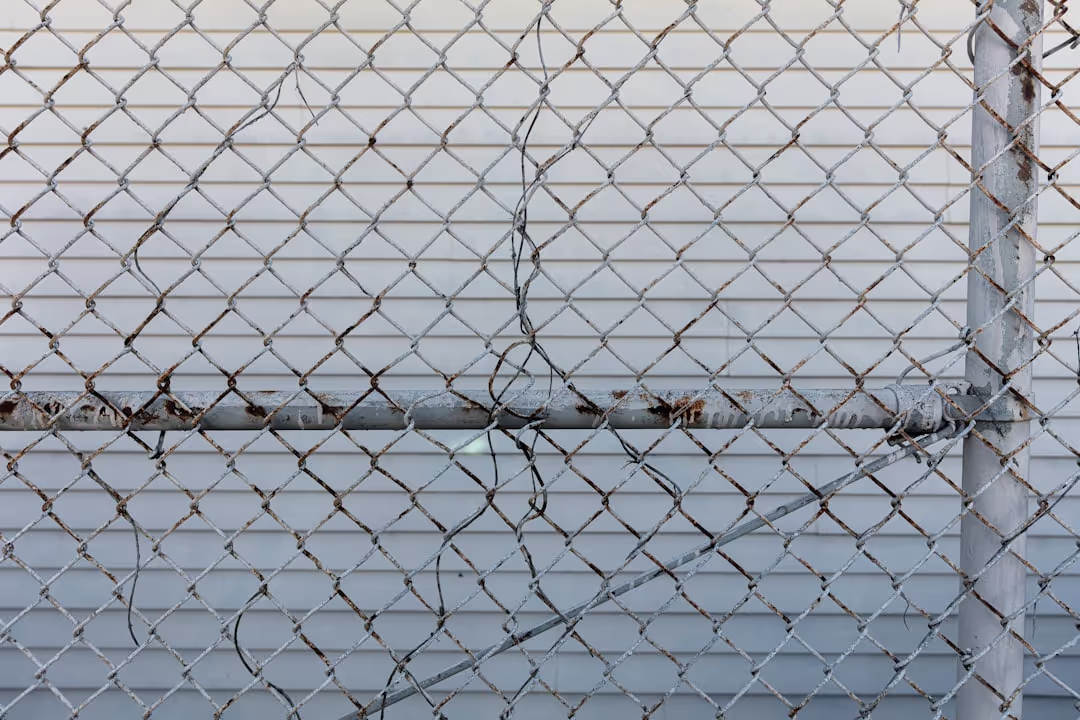
Chain link fencing is the most widely used security fencing in America, protecting everything from residential backyards to high-security industrial facilities. This versatile, diamond-mesh steel fencing offers an unbeatable combination of affordability, durability, and visibility that has made it the go-to choice for property owners for over 175 years.
Quick Chain Link Fencing Overview:
Whether you're a homeowner looking to secure your property, contain pets, or improve your backyard's functionality, chain link fencing delivers proven performance at a fraction of the cost of other materials.
This comprehensive guide covers everything you need to know about chain link fencing - from materials and installation to costs and maintenance.
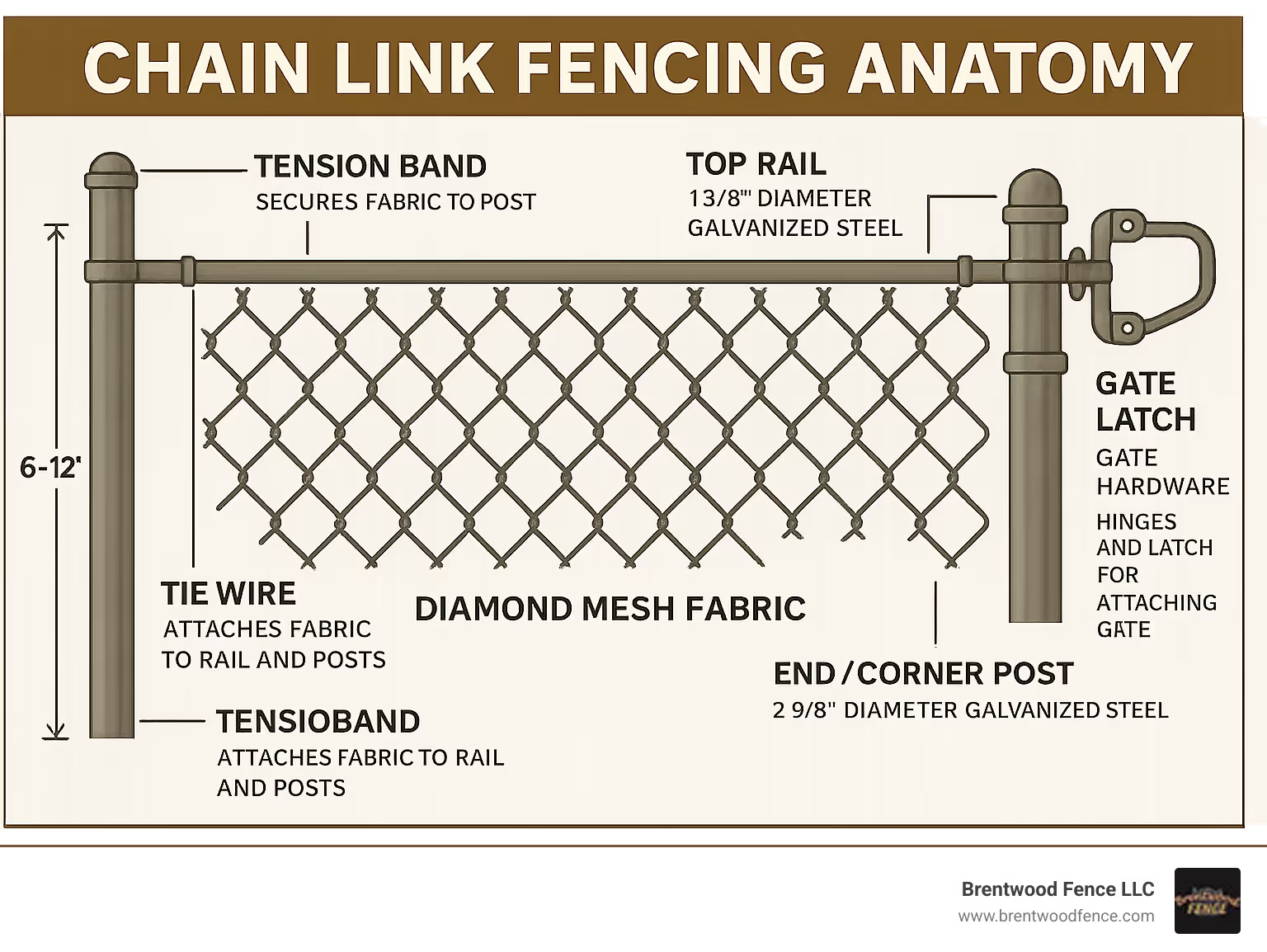
Chain link fencing terms to learn:
The distinctive diamond pattern is created in specialized manufacturing facilities where raw steel wire gets transformed through an intricate weaving process. Modern double-helix machines wind galvanized steel wire into interlocking zigzag spirals that create the diamond mesh we all recognize.
The heart of any chain link fencing system is galvanized steel wire, which gets its rust-fighting power from a protective zinc coating. This galvanization process gives chain link fencing its legendary durability, helping it withstand decades of weather without breaking down.
Vinyl-coated chain link has become increasingly popular, especially for residential applications. The vinyl coating comes in attractive colors like forest green, black, and brown, making the fence blend better with landscaping. Powder-coated finishes provide superior color retention and weather resistance.
Wire gauges range from 6 (the thickest and strongest) to 12 (the thinnest). Lower numbers mean thicker wire. Most residential applications use 9, 11, or 11.5 gauge wire, while commercial installations often specify the beefier 6 or 9 gauge options.
The standard mesh size is 2 inches, though specialty applications use different sizes. A complete system needs line posts and terminal posts to create the framework. Line posts support the fabric every 6 to 10 feet, while terminal posts anchor corners, ends, and gate openings. Top rails run horizontally along the fence top, adding strength and a finished look.
Other components include tension bars and bands, tie wires, and various fittings that hold everything together. Gates require specialized hardware, and everything gets anchored securely with concrete footings.
According to scientific research on corrosion resistance, properly galvanized chain link fencing can last 15-20 years or more with minimal maintenance.
Chain link fencing goes by several names - cyclone fence, hurricane fence, or diamond-mesh fence. This fencing style traces back to 1844 when inventors in Norwich, England adapted cloth-weaving machinery to work with metal wire. The real breakthrough came with the Mafera patent in 1930, which eliminated dangerous ragged edges.
Today, the Chain Link Fence Manufacturers Institute (CLFMI) sets industry standards that ensure quality and safety. The distinctive diamond pattern creates a flexible yet strong barrier that can bend without breaking while allowing wind to pass through.
The fabric rolls form your primary security barrier, typically coming in 50-foot lengths. Posts are the backbone - line posts support the fabric while terminal posts handle heavy lifting at corners and gates. Top rails add structural strength and professional appearance.
Tension bars and bands are critical for proper installation, threading through fabric at terminal posts. Tie wires attach fabric to posts and rails at regular intervals. Gate hardware requires quality hinges, latches, and wheel assemblies for larger gates.
For detailed information about selecting materials, check out our guide on Chain Link Fence Materials NH MA ME.
Chain link fencing has earned its reputation as America's most popular security solution for good reason. The biggest advantage? Chain link fencing costs up to 50% less than wood or vinyl alternatives, making it the most budget-friendly way to secure your property.
A properly installed galvanized chain link fence can protect your property for 15-20 years with surprisingly little maintenance. The security benefits are impressive - chain link provides excellent perimeter protection while maintaining visibility. You can see who's approaching your property, and the open mesh design handles wind beautifully.
Professional installation is typically completed in just 1-2 days for most residential projects. The versatility works equally well for containing pets, securing commercial properties, or protecting industrial facilities.
The main drawback is privacy - basic chain link won't block your neighbor's view. The industrial appearance also doesn't complement every architectural style, though modern coating options have improved aesthetics. There's also the climbing factor - chain link can be scaled more easily than solid fencing.
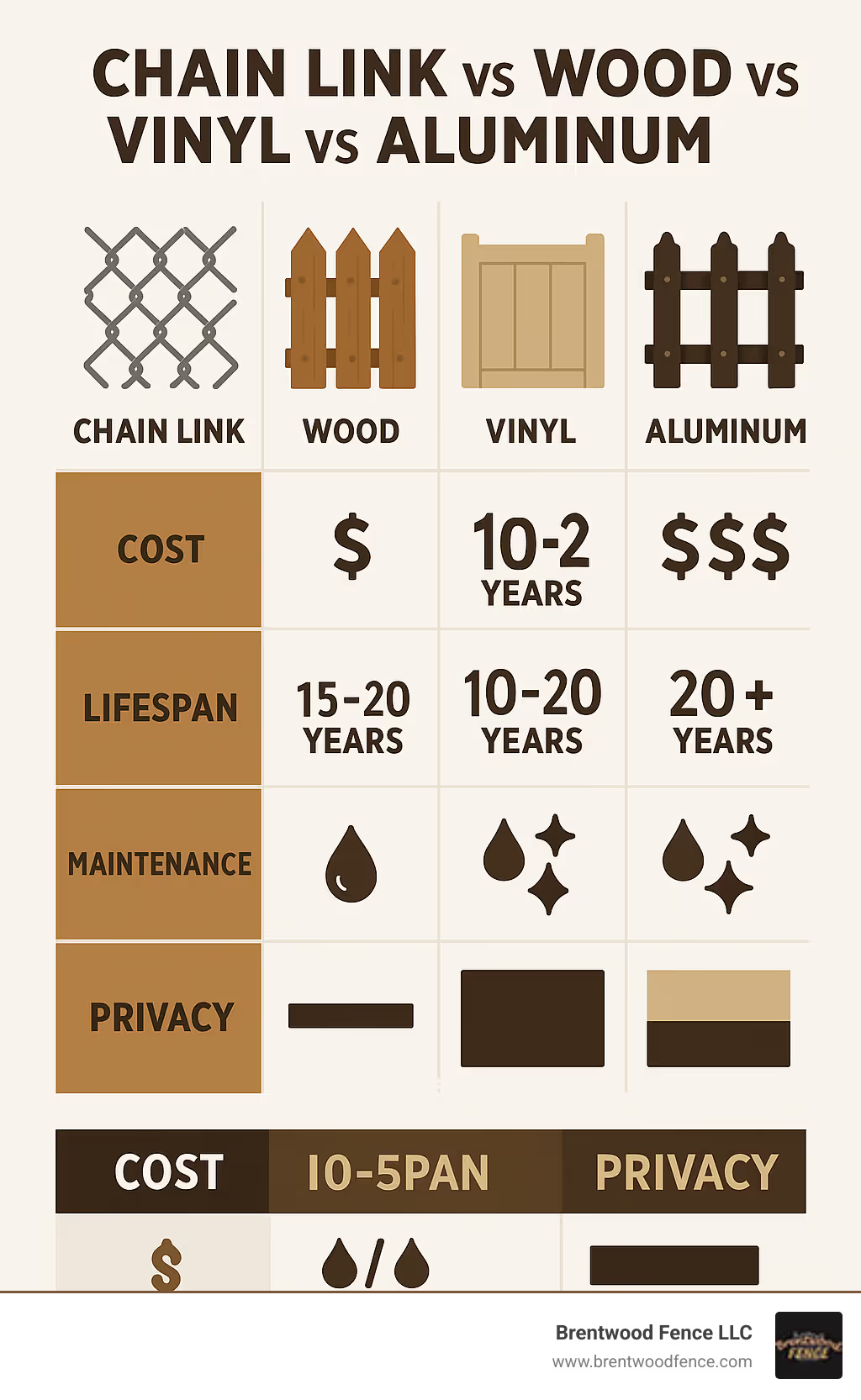
When comparing materials, chain link consistently wins on cost-effectiveness and durability.
Chain link fencing is surprisingly environmentally friendly. Steel is 100% recyclable, and the longevity means fewer replacement cycles compared to wood fencing. The maintenance requirements are refreshingly simple - occasional washing and inspection keeps your fence looking good and functioning properly.
For homeowners weighing options, our guide on Types of Fencing for Backyards provides detailed comparisons.
Picking the perfect chain link fencing for your property starts with understanding your specific needs.
Height is your first decision. For most homes, 4-6 feet works beautifully for property boundaries and pet containment. Businesses typically need 6-8 feet for better security. Industrial properties often go with 8-12 feet, sometimes topped with barbed wire.
Wire gauge determines strength. The numbers work backward - smaller numbers mean thicker, stronger wire. For residential use, 11.5 or 12 gauge works well. Most homeowners find 11 gauge hits the sweet spot between strength and cost. Commercial properties typically use 9 gauge, while industrial sites might need 6 gauge.
Coating choices affect looks and longevity. Standard galvanized chain link fencing gives you classic silver finish with excellent rust protection at the most affordable price. Vinyl-coated options cost more but come in attractive colors like black, green, brown, and white. Powder-coated finishes offer ultimate durability and color retention.
Don't forget wind load requirements and local building codes - these vary by location and affect your specifications.
Privacy doesn't have to be an afterthought. Privacy slats slip vertically through the mesh and come in various colors. They transform your see-through fence into an attractive barrier while keeping the security you need. Privacy screens offer another option for wind protection or visual screening.
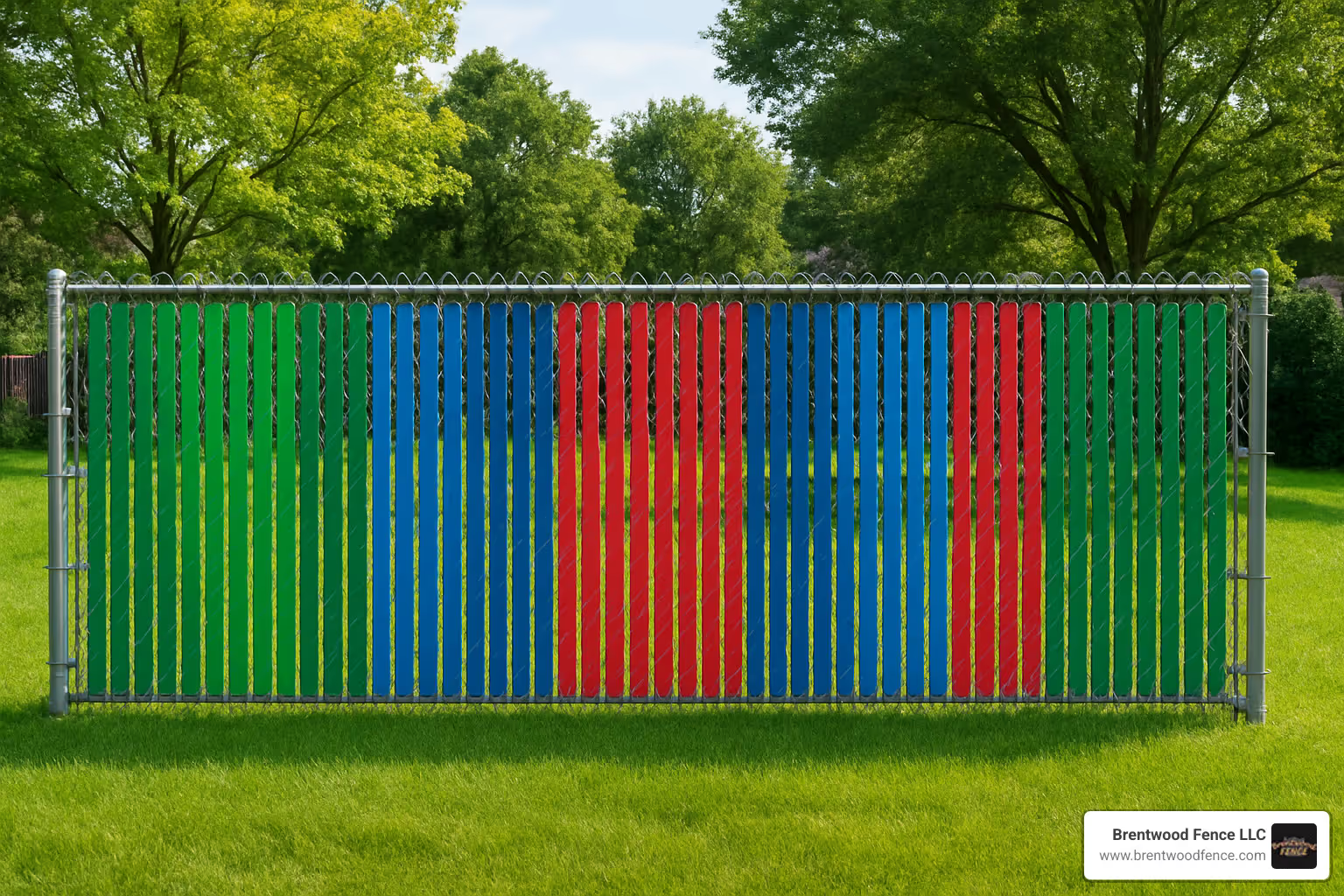
For challenging installations needing extra support, consider our Truss Rod Chain Link Fence option.
Homeowners usually find 4-6 foot heights perfect, with 11 or 11.5 gauge wire providing plenty of strength. Galvanized finish keeps costs down, while vinyl-coated options create a more polished look.
Pet owners need to think like their furry friends. Large dogs might clear a 4-foot fence, so 6-foot heights often work better. Make sure there aren't gaps at the bottom where escape artists can squeeze through.
Sports facilities love chain link because players and spectators can see clearly. Tennis courts often use 1.75-inch mesh to prevent balls from getting stuck.
Industrial yards demand heavy-duty performance with 9 or 6 gauge wire and 8-12 foot heights. Powder-coated finishes provide maximum durability in harsh environments.
Modern chain link fencing can be transformed with upgrades that boost privacy, security, and curb appeal. Privacy slats remain the most popular choice, turning see-through fencing into an attractive barrier.
Security upgrades include barbed wire topping for commercial properties, razor ribbon for high-security facilities, smart sensors for intrusion detection, and LED lighting systems for visibility and deterrence.
Aesthetic improvements include colored coatings, decorative post caps, and gate automation with motorized operators. These upgrades prove that chain link fencing doesn't have to look industrial.
Getting your chain link fencing installed correctly makes all the difference between a fence that lasts decades and one that starts sagging within a few years. Professional installation ensures your fence meets local codes, handles weather properly, and delivers the security you're counting on.
The installation process starts with thorough site preparation. Professional crews survey your property and mark all underground utilities. Post installation requires precision, especially for terminal posts at corners and gates. These anchor points need concrete footings that extend at least 30 inches deep. The concrete needs 24 to 48 hours to cure properly.
Line posts support the fence fabric every 6 to 10 feet. The fabric stretching phase separates professionals from DIY enthusiasts. This critical step requires specialized tools like come-along tensioners and experience to get right. Proper tension prevents sagging while avoiding over-tensioning that can snap wires or bend posts.
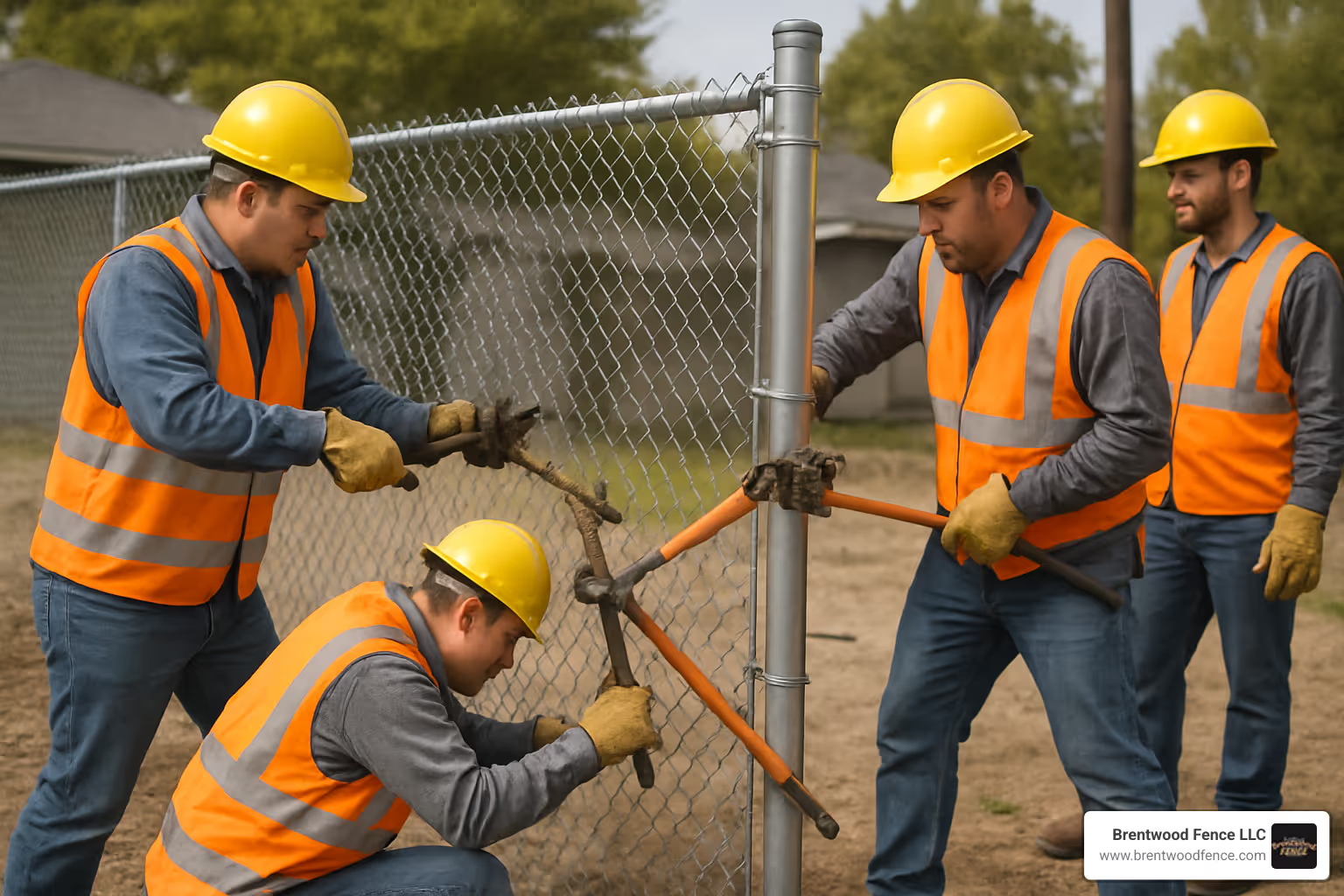
Safety considerations make professional installation appealing. Crews use proper protective equipment and follow OSHA guidelines. DIY installation carries real risks from heavy tools, concrete chemicals, and improperly tensioned fabric.
Maintenance Requirements
Chain link fencing is remarkably low-maintenance. Simple annual washing with soap and water removes dirt and debris. Annual inspections help catch small problems before they become expensive repairs. Look for loose connections, rust spots, or vegetation that's starting to damage the fabric.
Routine maintenance includes pressure washing when needed, touching up rust spots with galvanized spray paint, and keeping vegetation under control. Gate alignment deserves special attention since gates get the most use.
Professional maintenance services can extend your fence's life significantly. Our Chain Link Fencing Installation Services include maintenance programs for commercial clients.
Professional installation and basic maintenance will give you decades of reliable service from your chain link fence.
Chain link fencing costs vary significantly based on specifications, terrain, and local market conditions.
Material Costs: Expect $5-20 per linear foot for materials, with basic galvanized residential fencing at the lower end and heavy-duty commercial installations at the higher end.
Labor Costs: Professional installation typically runs $10-25 per linear foot, depending on terrain difficulty and local labor rates.
Additional Expenses:
Emerging Trends:
The chain link industry continues evolving with new technologies. Smart fence systems integrate sensors and monitoring capabilities, while eco-friendly coatings reduce environmental impact.
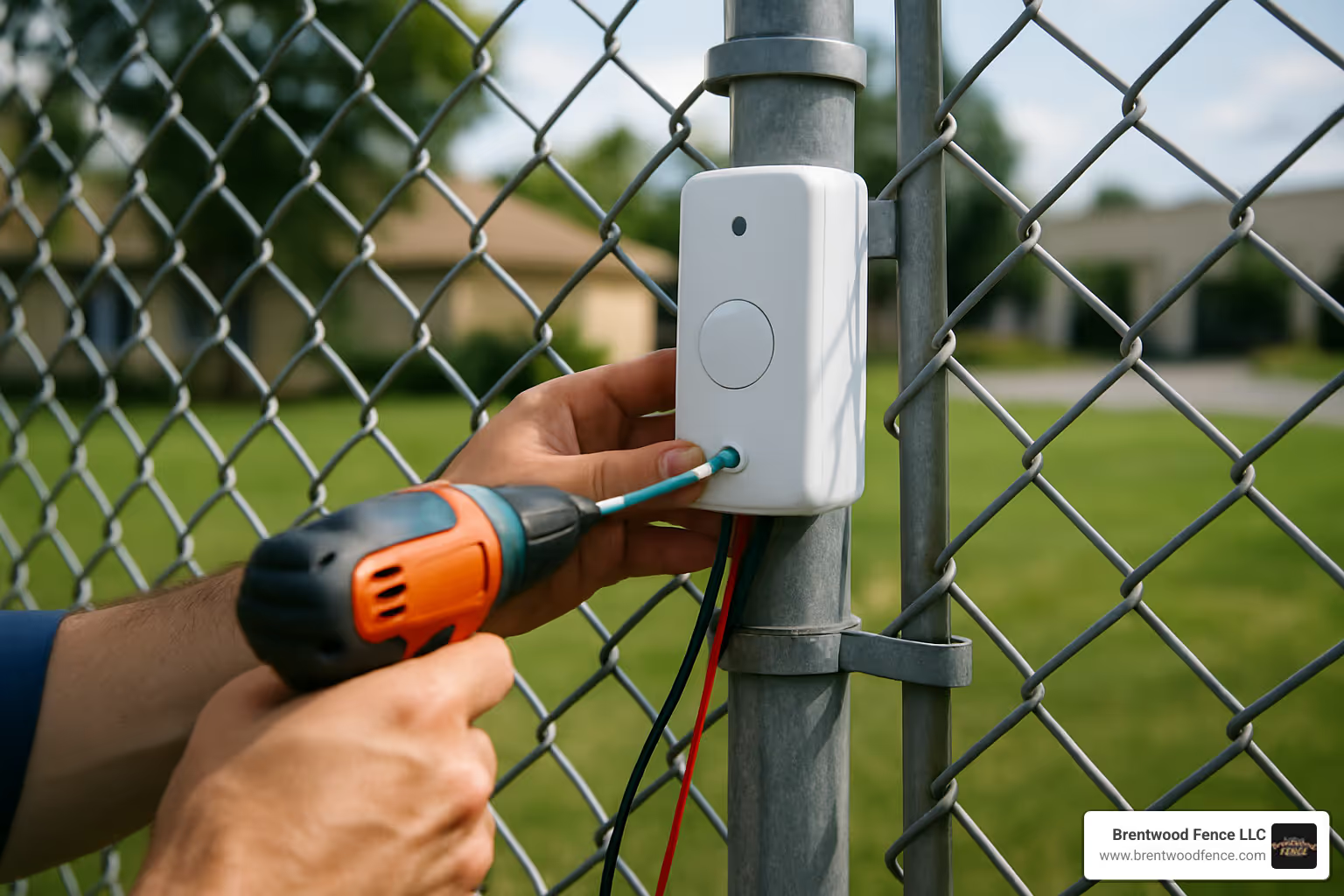
Technology Integration: Modern chain link systems can include motion sensors, cameras, and automated gates, changing basic fencing into comprehensive security systems.
Sustainable Options: Manufacturers are developing eco-friendly coatings and recycled content options. The inherent recyclability of steel makes chain link environmentally responsible.
Several factors impact total project cost:
Length: Longer fence runs cost more, but per-foot costs may decrease with larger projects.
Height: Taller fences require heavier posts and more labor. A 6-foot fence costs approximately 25% more than a 4-foot fence.
Gauge: Heavier gauge wire costs more but provides better durability. The price difference between 11.5 and 9 gauge is typically 15-20%.
Terrain: Sloped or rocky terrain increases complexity. Expect 20-50% premiums for challenging sites.
Privacy Add-ons: Slats add $3-8 per linear foot, while privacy screens cost $2-5 per linear foot.
Selecting the right installer is crucial. Look for contractors with proper licensing, insurance, and positive local references. CLFMI membership indicates commitment to industry standards.
Vetting Process:
The Chain Link Fence Manufacturers Institute provides resources for finding qualified installers.
We pride ourselves on transparent pricing, quality workmanship, and customer satisfaction throughout New Hampshire, Massachusetts, and Maine.
A properly installed galvanized chain link fence typically lasts 15-20 years with minimal maintenance, though many homeowners see their fence perform well beyond that timeframe. The galvanizing process coats steel wire with protective zinc that acts like armor against rust and corrosion.
Several factors influence longevity. Climate conditions play a big role - coastal salt air can shorten lifespan compared to inland locations. Maintenance quality makes a huge difference. Installation quality is critical - properly tensioned, securely anchored fences built to code will stand strong for decades. Wire gauge matters too, with heavier gauge wire naturally lasting longer.
In our experience serving New Hampshire, Massachusetts, and Maine, well-maintained galvanized chain link fencing often exceeds 20 years in typical residential applications.
Absolutely! You have several excellent options for adding color to your chain link fencing.
Vinyl-coated fencing is the most popular colored option. The vinyl coating is applied at the factory and comes in attractive colors like black, green, brown, or white. This provides color plus extra protection against elements, though it costs about 20-30% more than standard galvanized fencing.
Powder-coated finishes offer superior durability and color retention. If you live in harsh climate or want long-lasting color, powder coating is worth the investment.
Already have a galvanized fence? Field painting is possible with proper preparation using zinc-rich primer followed by high-quality exterior paint. Painted fences require more maintenance - scratches should be touched up promptly to prevent rust.
Most municipalities do require permits for fence installation, but requirements vary by location.
Height restrictions are common - many areas limit residential fences to 6 feet in backyards and 4 feet in front yards. Setback requirements typically mandate certain distances from property lines, utilities, and roadways.
Homeowner associations often need HOA approval on top of municipal permits, with their own rules about fence height, color, and style.
Commercial properties face more detailed regulations regarding specifications and security features.
We handle permit applications for our clients throughout New Hampshire, Massachusetts, and Maine, ensuring your chain link fencing project complies with all local codes. Don't skip the permit process - it's not worth the headache of potential teardown and rebuild.
Chain link fencing continues to be America's go-to security solution for good reason - it simply works. After more than 175 years of proven performance, this versatile fencing delivers unbeatable value through its winning combination of affordability, durability, and reliability.
The beauty of chain link lies in its adaptability. Choose the right height and gauge for your specific situation. Consider coating options like vinyl or powder coating for improved looks and extra protection. Factor in privacy improvements such as slats or screens if you prefer some screening while maintaining security benefits.
Chain link fencing keeps getting better with smart sensors for intrusion alerts, eco-friendly coatings, and new color options that help your fence blend beautifully with your landscape.
Professional installation makes all the difference. Proper tensioning, secure post setting, and local code compliance require specialized knowledge and tools. You'll pay more upfront, but that investment pays dividends through better performance and longer-lasting results.
Plan for minimal but important maintenance - a little cleaning and occasional inspection keeps your fence looking great and functioning perfectly. It's one of the lowest-maintenance investments you can make for your property.
Whether you're protecting a home in New Hampshire, securing a business in Massachusetts, or installing perimeter fencing at an industrial site in Maine, chain link offers proven performance at a price that makes sense.
Ready to find what chain link fencing can do for your property? We'd love to discuss your specific needs and show you how this time-tested solution can work for you. Our experienced team will help you choose perfect specifications and provide professional installation backed by comprehensive warranties.
For more information about working with experienced professionals, visit our guide on contacting the best local fencing company.
Copyright 2022 Brentwood Fence | All Rights Reserved | Sitemap | Website by Plumb Development a Digital Marketing Agency